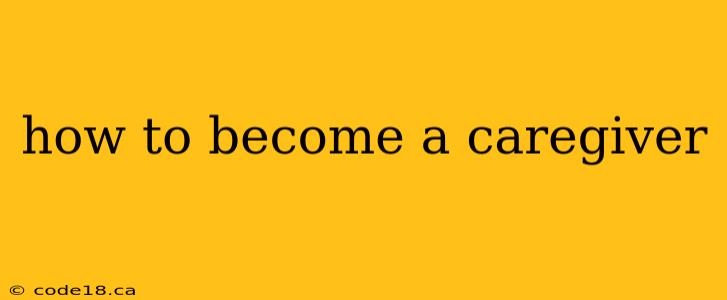Meta Description: Aspiring to become a caregiver? This comprehensive guide outlines the steps to becoming a certified caregiver, including education, certifications, licensing, and job search strategies. Discover the rewarding path of providing compassionate care. Learn about different caregiving settings, required skills, and how to find fulfilling employment opportunities.
What Does a Caregiver Do?
Caregivers provide a wide range of support to individuals who need assistance with their daily lives. This could be due to age, illness, disability, or recovery from surgery. Their responsibilities can vary greatly depending on the individual's needs and the care setting. Common tasks include:
- Personal Care: Bathing, dressing, grooming, toileting assistance.
- Household Tasks: Meal preparation, cleaning, laundry, errands.
- Medical Assistance: Monitoring vital signs, administering medication (under supervision), wound care.
- Companionship and Emotional Support: Engaging in conversation, providing emotional comfort, and reducing social isolation.
- Transportation: Assisting with appointments, shopping trips, and other outings.
Types of Caregiving Roles
The path to becoming a caregiver isn't a one-size-fits-all approach. Several options exist, each with its own requirements and rewards:
1. Home Health Aide (HHA)
HHAs provide basic personal care and support to individuals in their homes. They often work for home health agencies or independently. Certification is generally required, though specific requirements vary by state.
2. Certified Nursing Assistant (CNA)
CNAs work under the supervision of nurses and provide more direct medical care than HHAs. They assist with medication administration, wound care, and other clinical tasks. Becoming a CNA requires completing a state-approved training program and passing a certification exam.
3. Personal Care Assistant (PCA)
PCAs provide non-medical assistance with daily living activities. They might help with bathing, dressing, meal preparation, and light housekeeping. Formal training isn't always required, but experience and references are essential.
4. Geriatric Care Manager
Geriatric care managers assess the needs of older adults and develop care plans. They coordinate services, advocate for their clients, and help families navigate the complexities of aging. This role often requires a bachelor's degree in a related field and experience in geriatric care.
How to Become a Certified Caregiver
The specific steps involved depend on the type of caregiver role you choose. However, here's a general overview of the process:
1. Research and Choose a Caregiving Path
Carefully consider the type of caregiving that aligns with your skills, interests, and career goals. Research different roles to understand the responsibilities and required qualifications.
2. Education and Training
- Home Health Aide (HHA): Many states require completion of a state-approved training program. These programs typically last several weeks and cover essential skills like personal care, safety, and communication.
- Certified Nursing Assistant (CNA): Requires completing a state-approved CNA training program (typically 75-150 hours) and passing a state competency exam.
- Personal Care Assistant (PCA): While not always mandatory, on-the-job training and experience are highly beneficial. Consider taking online courses or workshops to enhance your skills.
3. Obtain Necessary Certifications and Licenses
Obtain the necessary certifications and licenses required by your state. Check your state's Department of Health or similar agency for specific requirements.
4. Gain Experience (if applicable)
Volunteer or shadow experienced caregivers to gain valuable hands-on experience. This can significantly enhance your resume and provide valuable insight into the daily realities of caregiving.
5. Build Your Resume and Cover Letter
Highlight your skills, experience, certifications, and any relevant volunteer work. Tailor your resume and cover letter to the specific job requirements.
Essential Skills for Caregivers
Success as a caregiver requires a blend of technical skills and personal qualities. Here are some key skills:
- Patience and Compassion: Working with individuals who may be experiencing physical or emotional challenges requires a high level of patience and empathy.
- Communication Skills: Effective communication is crucial for building rapport with clients and their families and for reporting observations to healthcare professionals.
- Physical Stamina: Caregiving can be physically demanding, requiring strength, endurance, and the ability to lift and transfer clients.
- Problem-Solving Skills: You'll need to be able to think on your feet and adapt to changing situations.
- Time Management Skills: Efficiently managing your time is essential to ensure you can meet the needs of your clients.
Finding Caregiving Jobs
Numerous avenues exist for finding caregiving positions:
- Online Job Boards: Sites like Indeed, Monster, and Care.com list many caregiver job openings.
- Home Health Agencies: Apply directly to home health agencies in your area.
- Hospitals and Nursing Homes: Many healthcare facilities hire caregivers.
- Networking: Talk to friends, family, and healthcare professionals about potential job openings.
The Rewards of Caregiving
While demanding, caregiving offers profound personal rewards:
- Making a Difference: You’ll have the opportunity to directly improve the lives of vulnerable individuals and their families.
- Developing Strong Relationships: You'll build meaningful connections with your clients and their loved ones.
- Gaining Valuable Skills: You'll acquire transferable skills applicable to various healthcare settings.
- Job Satisfaction: Many caregivers find their work deeply fulfilling and meaningful.
Becoming a caregiver is a rewarding journey. By following these steps and cultivating the necessary skills and qualities, you can embark on a career dedicated to providing compassionate and effective care. Remember to always prioritize your own well-being and seek support when needed.
